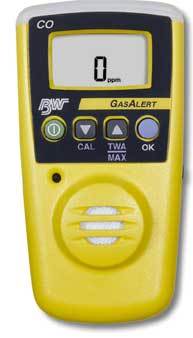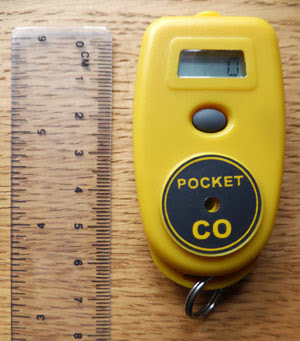I use a BW GasAlert Extreme Carbon Monoxide detector. It's great, you can't ignore it when it goes off...
For the last month or so, it complains on startup that its calibration period has expired and that it needs to be re-calibrated.
Where does one go for this? Alternatively, is it good enough to just reset the calibration period in the internal config?
Is it one of these

I've had mine since about 2003 and not had this come up yet, but I guess sending it to BW would be a start.
It's a great unit, picking up even the exhaust of the plane landing a short time before.
Is it one of these
Looks like the same gadget in a slightly different case.
Have already pinged BW, will let you know when/if I get a reply.
I have had one of these for a couple of years- I purchaced a cylinder of CO and calibrate as per the instructions once every 6 months.
I purchaced a cylinder of CO
Denis - where did you get it from? Google is being quite unhelpful finding a supplier this side of the atlantic, and its a pain to ship.
I use one of these...

Bought a year ago from KWJ Engineering, USA, who recommended it for GA use. I paid USD 139 plus USD 40 shipping.
Here is an extract from an email from the manufacturer giving further detail:
We have a large following of private aircraft owners and operators here in the US but have had limited sales in UK.
We would appreciate being able to inform more pilots of their CO detection options. BTW, many pilots mount the Pocket on a spot of velcro on their dash. Try and keep the Pocket away from direct heat sources and below 0C temperatures. Other than that Pocket CO
is a proven instrument for your application.
I own the Pocket CO, too and I am very happy it. By far the best device I could find and I searched the market for a long time. It is very small but the alarm is very loud.
Whether it's calibrated or not, is irrelevant to me. I don't want to know if it's 51 or 52ppm but whether there is CO or not. Mine is dangling from the roof close to my head and I can test it very well by doing a Vx climb with the heater on, it will show 1-2ppm in that case.
I would not fly without such a device, it is one of the most important safety devices. Just this year, I replaced my heat exchanger because it was close to starting to leak. This can get you killed and you won't even notice how you die. When was the last car built with a primitive exhaust heat exchanger? I know that Cessna took Volkswagen Beetle parts.
in response to jwoolard:- I bought the CO from jmw limited www.jmwlimited.co.uk the cost for a BW cal gas 100ppm CO/N2 cylinder was £128.40 (May last year) not cheap but I think it will see me through a number if years calibrations.
... sorry I forgot. In addition to the CO cylinder I did have to get a BW cylinder flow meter, I can't find the info on that at the moment but it will add to the cost- it should last a life time though.
For calibration, sweet talk your local fire department. Ask them if they can help you with a "bump test" of a CO detector. Perhaps take coffee and muffins, or a donation to their association.
If you can get a bottle of gas, you can put the bottle and the CO detector in a clear plastic bag. Force out as much air as you can from the bag. Discharge some gas into the bag, to inflate it (best done outdoors for safety). You should see a reading which corresponds to the calibration gas.
Do not put the CO detector in the stream of engine instructions for them which I have read forbid this.
The certification for GA aircraft is 49 PPM or less of CO. if you see a reading of 5 to 10 PPM in flight, I would not worry too much. Most planes I have tested leak a little.